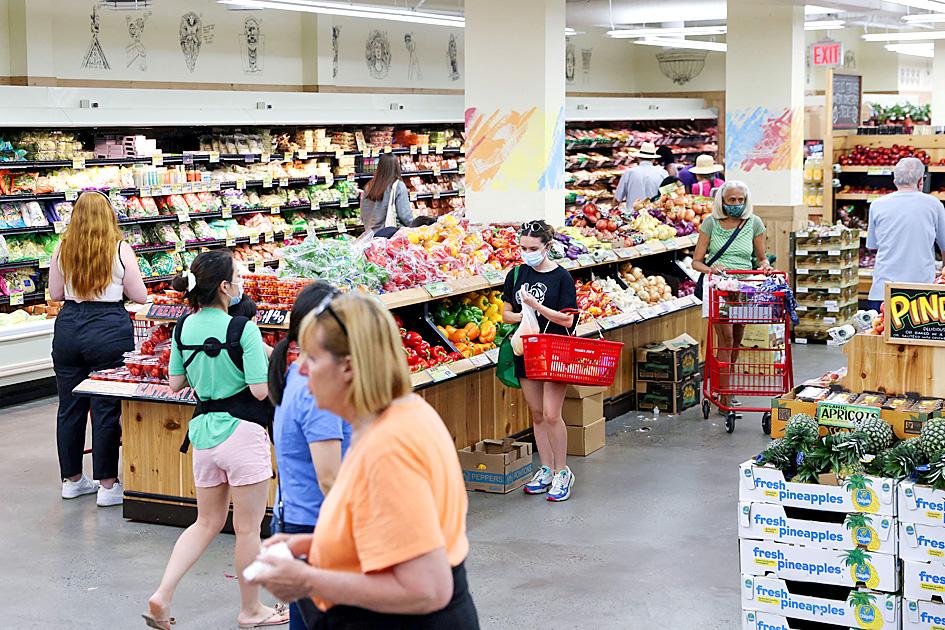More than half of consumers in major economies did not build up their savings during the COVID-19 pandemic, a survey showed.
The research in 18 nations by YouGov PLC, shared exclusively with Bloomberg News, punctures the idea that households have a cushion against a deepening cost of living crisis.
YouGov said that 51 percent of respondents failed to add to their savings during the pandemic.

Photo: Reuters
The rate was lowest for Germany, at 39 percent, while Italy’s figure was just 40 percent. Canada, the UK and US also had results of below 50 percent.
The survey covered 20,000 adults across 18 countries and undercuts hopes that a global savings glut would help households weather a spike in inflation. Instead, it paints an uneven picture of finances, potentially paving the way for deepening inequality in the coming months.
YouGov’s survey also suggests the nest eggs that did accumulate are rarely being spent on luxury items.
Of those who saved, about half are managing to hold onto the extra money, while more than one-quarter spent the money on bills or other essential purchases.
Just 13 percent used it to fund holidays and social events since restrictions lifted, and 19 percent used the money for home improvements or moving house.
British consumers are more pessimistic than their peers in major economies about the prospects for inflation and their own personal finances, YouGov’s survey said.
The findings add to evidence that the UK is being hit harder than most by a surge in consumer prices and shortages after the pandemic.
Of the British respondents, 71 percent expected the cost of living to “increase a lot” over the next 12 months.
That is higher than any other nation and well above the 48 percent reading in the US.
In total, nine-in-10 of those in the UK are bracing for higher costs, also the most in the survey.
The research backs up suggestions from economists that the UK is facing a unique inflation shock — and one that is likely to prove more enduring than in other advanced economies.
On top of the energy and supply chain shocks faced by other countries, the UK is grappling with a falling currency, the aftershocks of its departure from the EU and tax increases that threaten to eat further into incomes.
In the face of those events, 61 percent of British respondents expected their personal financial situation to worsen over the next year.
That is more than any other nation in the poll.
More than one-quarter predicted that things would get “a lot worse.”

SEEKING CLARITY: Washington should not adopt measures that create uncertainties for ‘existing semiconductor investments,’ TSMC said referring to its US$165 billion in the US Taiwan Semiconductor Manufacturing Co (TSMC, 台積電) told the US that any future tariffs on Taiwanese semiconductors could reduce demand for chips and derail its pledge to increase its investment in Arizona. “New import restrictions could jeopardize current US leadership in the competitive technology industry and create uncertainties for many committed semiconductor capital projects in the US, including TSMC Arizona’s significant investment plan in Phoenix,” the chipmaker wrote in a letter to the US Department of Commerce. TSMC issued the warning in response to a solicitation for comments by the department on a possible tariff on semiconductor imports by US President Donald Trump’s

The government has launched a three-pronged strategy to attract local and international talent, aiming to position Taiwan as a new global hub following Nvidia Corp’s announcement that it has chosen Taipei as the site of its Taiwan headquarters. Nvidia cofounder and CEO Jensen Huang (黃仁勳) on Monday last week announced during his keynote speech at the Computex trade show in Taipei that the Nvidia Constellation, the company’s planned Taiwan headquarters, would be located in the Beitou-Shilin Technology Park (北投士林科技園區) in Taipei. Huang’s decision to establish a base in Taiwan is “primarily due to Taiwan’s talent pool and its strength in the semiconductor

An earnings report from semiconductor giant and artificial intelligence (AI) bellwether Nvidia Corp takes center stage for Wall Street this week, as stocks hit a speed bump of worries over US federal deficits driving up Treasury yields. US equities pulled back last week after a torrid rally, as investors turned their attention to tax and spending legislation poised to swell the US government’s US$36 trillion in debt. Long-dated US Treasury yields rose amid the fiscal worries, with the 30-year yield topping 5 percent and hitting its highest level since late 2023. Stocks were dealt another blow on Friday when US President Donald

UNCERTAINTY: Investors remain worried that trade negotiations with Washington could go poorly, given Trump’s inconsistency on tariffs in his second term, experts said The consumer confidence index this month fell for a ninth consecutive month to its lowest level in 13 months, as global trade uncertainties and tariff risks cloud Taiwan’s economic outlook, a survey released yesterday by National Central University found. The biggest decline came from the timing for stock investments, which plunged 11.82 points to 26.82, underscoring bleak investor confidence, it said. “Although the TAIEX reclaimed the 21,000-point mark after the US and China agreed to bury the hatchet for 90 days, investors remain worried that the situation would turn sour later,” said Dachrahn Wu (吳大任), director of the university’s Research Center for